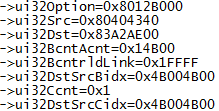Hi TI
I have a EDMA memory transfer from one memory location to another both in external memory. Size is about 19 kB. I use cache invalidation to ensure the cache is flushed, but tests have shown that some of the memory isn't flushed.
Here is what I do:
1) memset(&stDataFile[ui8DataFileIndex].stData, 0, sizeof(stDataFile[ui8DataFileIndex].stData));
2) BCACHE_wbInv(&stDataFile[ui8DataFileIndex].stData, sizeof(&stDataFile[ui8DataFileIndex].stData), TRUE);
3) Initaite EDMA transfer
4) wait for EDMA transfer to complete by checking bit in IprH register
5) BCACHE_inv(&stDataFile[ui8DataFileIndex].stData, sizeof(stDataFile[ui8DataFileIndex].stData), TRUE);
If I check the data right after step 5, there is random ranges in the memory with the value 0 (from the memset in step 1).
If I wait a couple of ms (TSK_sleep) or longer the data is correct.
Any suggestions of what might cause this?




